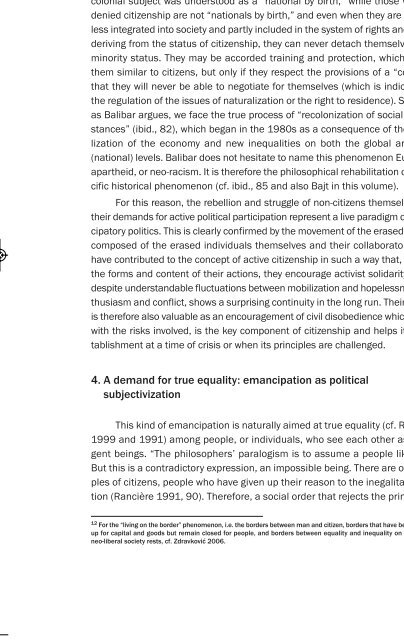The Scars of the Erasure_web
The Scars of the Erasure_web
The Scars of the Erasure_web
- No tags were found...
You also want an ePaper? Increase the reach of your titles
YUMPU automatically turns print PDFs into web optimized ePapers that Google loves.
<strong>Erasure</strong>_4a 10.1.11 20:29 Page 270270 THE SCARS OF THE ERASURErights. Those who are denied citizenship (foreign workers, asylum seekers, “illegalimmigrants” and in our case <strong>the</strong> erased people) point precisely to this emptysite where citizenship and nationality diverge. 12Balibar showed that this is a consequence <strong>of</strong> <strong>the</strong> colonial heritage: <strong>the</strong>colonial subject was understood as a “national by birth,” while those who aredenied citizenship are not “nationals by birth,” and even when <strong>the</strong>y are more orless integrated into society and partly included in <strong>the</strong> system <strong>of</strong> rights and dutiesderiving from <strong>the</strong> status <strong>of</strong> citizenship, <strong>the</strong>y can never detach <strong>the</strong>mselves fromminority status. <strong>The</strong>y may be accorded training and protection, which makes<strong>the</strong>m similar to citizens, but only if <strong>the</strong>y respect <strong>the</strong> provisions <strong>of</strong> a “contract”that <strong>the</strong>y will never be able to negotiate for <strong>the</strong>mselves (which is indicated by<strong>the</strong> regulation <strong>of</strong> <strong>the</strong> issues <strong>of</strong> naturalization or <strong>the</strong> right to residence). So today,as Balibar argues, we face <strong>the</strong> true process <strong>of</strong> “recolonization <strong>of</strong> social circumstances”(ibid., 82), which began in <strong>the</strong> 1980s as a consequence <strong>of</strong> <strong>the</strong> globa -lization <strong>of</strong> <strong>the</strong> economy and new inequalities on both <strong>the</strong> global and local(national) levels. Balibar does not hesitate to name this phenomenon Europeanapar<strong>the</strong>id, or neo-racism. It is <strong>the</strong>refore <strong>the</strong> philosophical rehabilitation <strong>of</strong> a specifichistorical phenomenon (cf. ibid., 85 and also Bajt in this volume).For this reason, <strong>the</strong> rebellion and struggle <strong>of</strong> non-citizens <strong>the</strong>mselves and<strong>the</strong>ir demands for active political participation represent a live paradigm <strong>of</strong> emancipatorypolitics. This is clearly confirmed by <strong>the</strong> movement <strong>of</strong> <strong>the</strong> erased people,composed <strong>of</strong> <strong>the</strong> erased individuals <strong>the</strong>mselves and <strong>the</strong>ir collaborators. <strong>The</strong>yhave contributed to <strong>the</strong> concept <strong>of</strong> active citizenship in such a way that, through<strong>the</strong> forms and content <strong>of</strong> <strong>the</strong>ir actions, <strong>the</strong>y encourage activist solidarity, whichdespite understandable fluctuations between mobilization and hopelessness, enthusiasmand conflict, shows a surprising continuity in <strong>the</strong> long run. <strong>The</strong>ir activityis <strong>the</strong>refore also valuable as an encouragement <strong>of</strong> civil disobedience which, alongwith <strong>the</strong> risks involved, is <strong>the</strong> key component <strong>of</strong> citizenship and helps its re-establishmentat a time <strong>of</strong> crisis or when its principles are challenged.4. A demand for true equality: emancipation as politicalsubjectivizationThis kind <strong>of</strong> emancipation is naturally aimed at true equality (cf. Rancière1999 and 1991) among people, or individuals, who see each o<strong>the</strong>r as intelligentbeings. “<strong>The</strong> philosophers’ paralogism is to assume a people like man.But this is a contradictory expression, an impossible being. <strong>The</strong>re are only peoples<strong>of</strong> citizens, people who have given up <strong>the</strong>ir reason to <strong>the</strong> inegalitarian fiction(Rancière 1991, 90). <strong>The</strong>refore, a social order that rejects <strong>the</strong> principle <strong>of</strong>12 For <strong>the</strong> “living on <strong>the</strong> border” phenomenon, i.e. <strong>the</strong> borders between man and citizen, borders that have been openingup for capital and goods but remain closed for people, and borders between equality and inequality on which postneo-liberalsociety rests, cf. Zdravković 2006.


